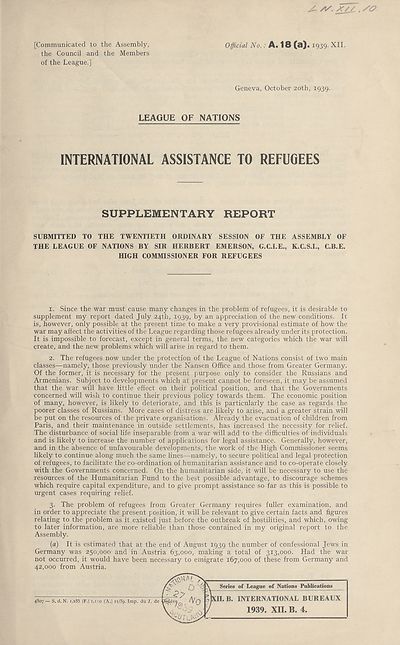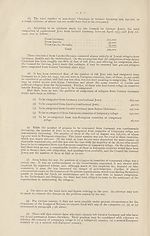Download files
Complete book:
Individual page:
Thumbnail gallery: Grid view | List view

[Communicated to the Assembly, Official No.: !K.\S {Bi). 1939. XII.
the Council and the Members
of the League.]
Geneva, October 20th, 1939.
LEAGUE OF NATIONS
INTERNATIONAL ASSISTANCE TO REFUGEES
SUPPLEMENTARY REPORT
SUBMITTED TO THE TWENTIETH ORDINARY SESSION OF THE ASSEMBLY OF
THE LEAGUE OF NATIONS BY SIR HERBERT EMERSON, G.C.I.E., K.C.S.L, C.B.E.
HIGH COMMISSIONER FOR REFUGEES
1. Since the war must cause many changes in the problem of refugees, it is desirable to
supplement my report dated July 24th, 1939, by an appreciation of the new conditions. It
is, however, only possible at the present time to make a very provisional estimate of how the
war may affect the activities of the League regarding those refugees already under its protection.
It is impossible to forecast, except in general terms, the new categories which the war will
create, and the new problems which will arise in regard to them.
2. The refugees now under the protection of the League of Nations consist of two main
classes—namely, those previously under the Nansen Office and those from Greater Germany.
Of the former, it is necessary for the present purpose only to consider the Russians and
Armenians. Subject to developments which at present cannot be foreseen, it may be assumed
that the war will have little effect on their political position, and that the Governments
concerned will wish to continue their previous policy towards them. The economic position
of many, however, is likely to deteriorate, and this is particularly the case as regards the
poorer classes of Russians. More cases of distress are likely to arise, and a greater strain will
be put on the resources of the private organisations. Already the evacuation of children from
Paris, and their maintenance in outside settlements, has increased the necessity for relief.
The disturbance of social life inseparable from a war will add to the difficulties of individuals
and is likely to increase the number of applications for legal assistance. Generally, however,
and in the absence of unfavourable developments, the work of the High Commissioner seems
likely to continue along much the same lines—namely, to secure political and legal protection
of refugees, to facilitate the co-ordination of humanitarian assistance and to co-operate closely
with the Governments concerned. On the humanitarian side, it will be necessary to use the
resources of the Humanitarian Fund to the best possible advantage, to discourage schemes
which require capital expenditure, and to give prompt assistance so far as this is possible to
urgent cases requiring relief.
3. The problem of refugees from Greater Germany requires fuller examination, and
in order to appreciate the present position, it will be relevant to give certain facts and figures
relating to the problem as it existed just before the outbreak of hostilities, and which, owing
to later information, are more reliable than those contained in my original report to the
Assembly.
[a) It is estimated that at the end of August 1939 the number of confessional Jews in
Germany was 250,000 and in Austria 63,000, making a total of 313,000. Had the war
not occurred, it would have been necessary to emigrate 167,000 of these from Germany and
42,000 from Austria.
the Council and the Members
of the League.]
Geneva, October 20th, 1939.
LEAGUE OF NATIONS
INTERNATIONAL ASSISTANCE TO REFUGEES
SUPPLEMENTARY REPORT
SUBMITTED TO THE TWENTIETH ORDINARY SESSION OF THE ASSEMBLY OF
THE LEAGUE OF NATIONS BY SIR HERBERT EMERSON, G.C.I.E., K.C.S.L, C.B.E.
HIGH COMMISSIONER FOR REFUGEES
1. Since the war must cause many changes in the problem of refugees, it is desirable to
supplement my report dated July 24th, 1939, by an appreciation of the new conditions. It
is, however, only possible at the present time to make a very provisional estimate of how the
war may affect the activities of the League regarding those refugees already under its protection.
It is impossible to forecast, except in general terms, the new categories which the war will
create, and the new problems which will arise in regard to them.
2. The refugees now under the protection of the League of Nations consist of two main
classes—namely, those previously under the Nansen Office and those from Greater Germany.
Of the former, it is necessary for the present purpose only to consider the Russians and
Armenians. Subject to developments which at present cannot be foreseen, it may be assumed
that the war will have little effect on their political position, and that the Governments
concerned will wish to continue their previous policy towards them. The economic position
of many, however, is likely to deteriorate, and this is particularly the case as regards the
poorer classes of Russians. More cases of distress are likely to arise, and a greater strain will
be put on the resources of the private organisations. Already the evacuation of children from
Paris, and their maintenance in outside settlements, has increased the necessity for relief.
The disturbance of social life inseparable from a war will add to the difficulties of individuals
and is likely to increase the number of applications for legal assistance. Generally, however,
and in the absence of unfavourable developments, the work of the High Commissioner seems
likely to continue along much the same lines—namely, to secure political and legal protection
of refugees, to facilitate the co-ordination of humanitarian assistance and to co-operate closely
with the Governments concerned. On the humanitarian side, it will be necessary to use the
resources of the Humanitarian Fund to the best possible advantage, to discourage schemes
which require capital expenditure, and to give prompt assistance so far as this is possible to
urgent cases requiring relief.
3. The problem of refugees from Greater Germany requires fuller examination, and
in order to appreciate the present position, it will be relevant to give certain facts and figures
relating to the problem as it existed just before the outbreak of hostilities, and which, owing
to later information, are more reliable than those contained in my original report to the
Assembly.
[a) It is estimated that at the end of August 1939 the number of confessional Jews in
Germany was 250,000 and in Austria 63,000, making a total of 313,000. Had the war
not occurred, it would have been necessary to emigrate 167,000 of these from Germany and
42,000 from Austria.
Set display mode to:
![]() Universal Viewer |
Universal Viewer | ![]() Mirador |
Large image | Transcription
Mirador |
Large image | Transcription
Images and transcriptions on this page, including medium image downloads, may be used under the Creative Commons Attribution 4.0 International Licence unless otherwise stated. ![]()
| League of Nations > International > International assistance to refugees > October 20th 1939 > (1) |
|---|
| Permanent URL | https://digital.nls.uk/194918111 |
|---|
| Attribution and copyright: |
|
|---|---|
| Description | Reports submitted to assembly. |
|---|---|
| Shelfmark | LN.XII.10 |
| Shelfmark | LN.XII |
|---|
| Description | Over 1,200 documents from the non-political organs of the League of Nations that dealt with health, disarmament, economic and financial matters for the duration of the League (1919-1945). Also online are statistical bulletins, essential facts, and an overview of the League by the first Secretary General, Sir Eric Drummond. These items are part of the Official Publications collection at the National Library of Scotland. |
|---|---|
| Additional NLS resources: |
|
